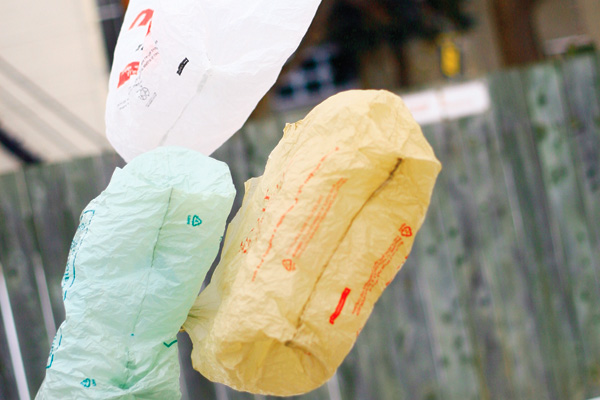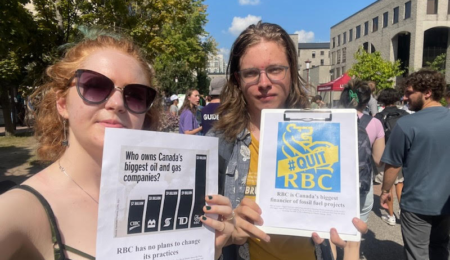Are plastic bags that big of an environmental issue?
Photo courtesy of Tina Wallace
Point: We should focus on more important issues
Jasmine van Schouwen | Fulcrum Staff
Companies who claim they are curbing pollution by reducing plastic bag production are misleading and short-sighted.
Plastic bags are a problem, there’s no doubt about that. According to the non-profit Center for Marine Conservation, plastic bags are among the 12 items of debris most often found in coastal clean-ups. They are also photodegradable, which means they break down into smaller toxic bits and contaminate soil and waterways and enter the food web when animals accidentally ingest them.
But the debate over plastic bag bans has distracted us from much more pressing environmental issues.
Like many “green” initiatives and products, the bag ban lulls consumers into the comfortable notion that they are making a significant difference by trying to lug their cart full of imported packaged goods back home, or by occasionally bringing their own reusable shopping bags to their local giant grocery store chain. (Let’s be honest, if you forget them in the car in mid-January, you sure as hell aren’t going back out to get them.)
Just like the companies who sell environmentally friendly bathroom cleaners in large non-recyclable containers, or “green” ink cartridges sold in multiple layers of plastic packaging, the stores charging for bags celebrate this small step forward while failing to see the bigger picture. Sure, the plastic bag bans will make a difference, but they only curb a minuscule portion of the litter that actually affects the environment.
The fact is that the great majority of the plastic debris found in coastal systems actually comes from non-recyclable packaging of consumer goods. And we aren’t even talking about the greenhouse gas emissions produced by the same companies that are “going green” by charging for plastic bags.
The same companies that undertake this initiative often fail to take steps that could make a much more profound impact, like purchasing local products and business supplies, going paperless, switching to energy-efficient lighting, or cutting down on elaborate packaging.
Similarly, you’ll notice that the people who tend to get upset at you for saying “yes” to the five-cent plastic bag are often the same ones who buy products flown in from all four corners of the earth and drive home by themselves in a car made for seven people.
Of course, every initiative counts, but just because you declined a plastic bag at the checkout doesn’t mean your environmental duty is done. Maybe you didn’t notice your steak sandwich was wrapped in two layers of plastic, or maybe you didn’t know that beef produces 27 kg of carbon dioxide and methane for every kilogram eaten, but there are many ways we can improve our daily environmental footprint.
At the end of the day, as long as we remain preoccupied with the plastic bag fight, we are failing to grasp the larger message of environmentalism. We must fundamentally change the way we are doing things to create a safe and healthy planet for future generations — a goal that demands more than five cents.
Counterpoint:Plastic bag reduction needs to be taken more seriously
Nadia Helal |Fulcrum Staff
Plastic bags are an important environmental problem, and we’re not doing enough to fix the problem.
Charging a nickel a bag is no big deal, and one can easily rationalize that the money is going to a worthy environmental cause, but the problem is that a nickel is simply not enough of a deterrent for potential plastic bag users.
Beyond this, many people seem to prefer dishing out $1 for a stronger, longer-lasting bag, yet are forgetting them at home. There are three possible outcomes to this scenario. 1) They carry their groceries by hand, which few do. 2) They buy another $1 reusable plastic bag, or 3) They simply ask for regular plastic bags and pay the five cents. The end result is the same: more plastic.
If the plastic bags were sold for 25 cents each or more, I’m sure the public wouldn’t be so prone to leaving their reusable bags at home or in the car.
Most people seem to be aware about the perils of plastic bags but tend to turn a blind eye to the environmental facts. Plastic bags are horrible for so many reasons. Close to a billion bags end up in the garbage every year. Furthermore, it takes each one approximately 1,000 years to break down because they are made from non-renewable natural resources. Since these bags are lightweight and durable, they can travel great distances and wreak environmental havoc in many different places.
The saddest part about plastic bags is that some animals don’t have the sense to understand the damage they can cause, so they eat them or try to play with them.
Approximately 100,000 whales, seals, turtles, and birds die every year due to plastic bag consumption. I have caught one of my cats trying to eat plastic bags on numerous occasions and some friends have told me that they need to hide bags in case their pets get a hold of them.
It’s easy for environmentalists and idealistic do-gooders to simply suggest banning plastic bags completely, but this is not a realistic prospect for the time being. Unfortunately, we live in a society that progresses at a much slower pace and the fight for plastic bag reduction is far from reality. For now, I believe the cost of plastic bags should be raised by at least 20 cents so that people might take the issue more serouisly.
Loblaws was one of the first grocery store chains to start the charge-per-bag movement and since 2007, the chain has reportedly reduced the number of plastic bags by 5 billion in Canada alone. If that much of a difference can be made with five cents, imagine the benefits of charging a little more.
The fight for plastic bag reduction is one of the most important and easily attainable goals for our generation. They are a nuisance to landfills and animals around the world. If charging people a quarter to use a debit card is a common practice, why not charge the same (or more) for plastic bags?






